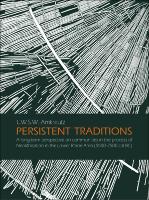Persistent Traditions
A long-term perspective on communities in the process of Neolithisation in the Lower Rhine Area (5500-2500 cal BC)
Author(s)
Amkreutz, Luc W.S.W.
Collection
Dutch Research Council (NWO)Language
EnglishAbstract
The adoption of agriculture is one of the major developments in human history. Archaeological studies have demonstrated that the trajectories of Neolithisation in Northwest Europe were diverse. This book presents a study into the archaeology of the communities involved in the process of Neolithisation in the Lower Rhine Area (5500-2500 cal BC). It elucidates the role played by the indigenous communities in relation to their environmental context and in view of the changes that becoming Neolithic brought about. This work brings together a comprehensive array of excavated archaeological sites in the Lower Rhine Area. Their analysis shows that the succession of Late Mesolithic, Swifterbant culture, Hazendonk group and Vlaardingen culture societies represents a continuous long-term tradition of inhabitation of the wetlands and wetland margins of this area, forming a culturally continuous record of communities in the transition to agriculture. After demonstrating the diversity of the Mesolithic, the subsequent developments regarding Neolithisation are studied from an indigenous perspective. Foregrounding the relationship between local communities and the dynamic wetland landscape, the study shows that the archaeological evidence of regional inhabitation points to long-term flexible behaviour and pragmatic decisions being made concerning livelihood, food economy and mobility. This disposition also influenced how the novel elements of Neolithisation were incorporated. Animal husbandry, crop cultivation and sedentism were an addition to the existing broad spectrum economy but were incorporated within a set of integrative strategies. For the interpretation of Neolithisation this study offers a complementary approach to existing research. Instead of arguing for a short transition based on the economic importance of domesticates and cultigens at sites, this study emphasises the persistent traditions of the communities involved. New elements, instead of bringing about radical changes, are shown to be attuned to existing hunter-gatherer practices. By documenting indications of the mentalité of the inhabitants of the wetlands, it is demonstrated that their mindset remained essentially ‘Mesolithic’ for millennia. This book is accompanied by a separate 422 page volume containing the appendices. These constitute a comprehensive inventory of 159, mostly excavated archaeological sites in the Lower Rhine Area.
Keywords
archaeology; neolithic; wetland archaeology; identity; neolithisation; domestication; settlementPublisher
Sidestone PressPublisher website
https://www.sidestone.com/Publication date and place
Leiden, 2013Imprint
Sidestone Press DissertationsClassification
Archaeology by period / region
Prehistory


 Download
Download Web Shop
Web Shop